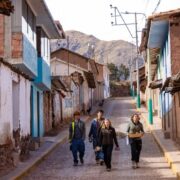Every year, tens of thousands of families search for the perfect summer program for their students. It’s an exciting prospect, but the options can feel endless, ranging from summer camps and smaller, niche operators to massive organizations owned by investment groups or large holding companies. It can be hard to know where to start your research, or what to prioritize.
In this landscape of countless options, where many organizational messages admittedly sound similar, longevity and mission matter more than ever as parents and students search for programs that offer learning, fun, safety, and growth.
1. Consider Organizational Ownership
The world of student travel and summer programs has changed significantly over the past two decades. Some organizations are several decades old, founded by educators or family teams who built their programs from the ground up. Others are newer, structured as startups or subsidiaries of larger corporate groups.
This is important to consider: a student travel organization’s ownership and structure has real impacts on focus, accountability, safety, and quality.
Some companies are backed by venture capital or private investors who expect quick returns. Others have been acquired by holding firms that manage a portfolio of travel or education brands. These business models can influence priorities, sometimes emphasizing scale or marketing metrics over depth of experience or long-term educational outcomes.
By contrast, organizations like Putney that have remained independent and family-led tend to measure success differently: in the safety, learning, and transformation of each student, year after year.
2. Why Independence Matters
Put simply, an independent organization can take the long view. Without outside investors to satisfy, decisions stay centered on educational integrity, safety, and the wellbeing of students—not quarterly targets. Programs can evolve thoughtfully, maintaining relationships with local communities, and sustaining a consistent educational philosophy.
Putney Student Travel, founded in 1951, has operated continuously under family leadership for more than 75 years. That independence sets us apart and allows us to prioritize purpose over profit, investing in deep partnerships, rigorous leader training, and intentional program design that places student growth first.
3. Experience Is the Best Safety System
Experience isn’t just a buzzword. It’s a proven safeguard. The nature of operating summer travel programs is complex: weather, logistics, health, local dynamics, and cultural nuance all require seasoned judgment. Organizations like Putney that have operated for decades carry institutional knowledge that no manual or policy document can replace.
- Families research student travel programs should look for (and ask about):
- A verifiable history of operation through multiple global events.
- Transparent safety frameworks backed by long-term data, not just marketing claims.
- Experienced program leaders: adult educators and professionals, not just guides or college students.
- A responsive headquarters team that manages risk and supports field staff 24/7.
An organization that has safely guided students around the world for generations has already learned and refined its systems through lived experience.
4. What to Ask Before You Enroll
When comparing student travel programs, these questions help reveal what truly drives an organization:
- Who owns the company, and how long have they been operating?
- Is it family-run, nonprofit, or part of a private equity or holding firm portfolio?
- How are leaders selected and trained, and what is their professional background?
- What systems are in place for communication, emergencies, and medical support?
- How does the organization define “success” for students?
Families are often surprised by how revealing ownership and history can be. A newer or investor-backed company may offer glossy marketing and big promises, but longevity shows something deeper: a proven ability to deliver safe, meaningful experiences year after year.
5. Keeping Education at the Core
At Putney, every single program begins with the same educational goal that guided our founders: to spark curiosity, independence, and empathy through real engagement with the world. Whether students are working alongside local partners, practicing a new language, or exploring career paths in science, art, or the humanities, the experience is designed to stretch and inspire.
Much more than the many “teen tour” options out there, Putney programs are designed not just to entertain for two weeks, but to transform perspective for years to come.
That’s the difference between a trip and a program: intentional design, rooted in decades of purpose.
6. Choosing Trust and Legacy
For parents, peace of mind comes from knowing who you’re entrusting your child to. A company that’s led the way for 75 years in student travel has done so because families return, leaders stay engaged and connected, and values endure. Independence means accountability to one thing only: the families and students we serve.
Putney Student Travel is proud to continue that legacy as a family-led organization dedicated to education, connection, and safe exploration since 1951.
Explore Programs for This Summer
Discover hands-on programs in Service, Language, Exploration, and Career themes, built to help your student see the world with confidence, curiosity, and care.






